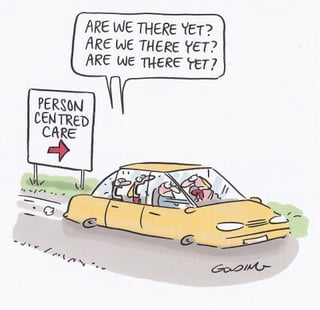EMR (Electronic Medical Record) and EHR (Electronic Health Record) systems are great for hospitals and doctors' offices but when it comes to agencies supporting people with intellectual and developmental disabilities, they're almost never the right fit.
Here's why:
1. Provider agencies and medical care facilities are very different places:
EMRs are designed to be used in hospitals and offices, and most of them are sold to be used out-of-the box, without many opporturinties for modification or customization. Providing direct supports is not the same as medical treatment and the kind of records used in hospitals can't capture the entire story (or all of the required documentation) that comes along with supporting a person with a developmental disabiliy.
2. The goal isn't to "discharge" people with I/DD
EMRs follow a workflow that clearly has a beginning, middle and end. Their medical nature has them focused on records management and the creation and documentation of patient assessments and treatment plans. The whole idea is to diagnose the issues, treat the “patient”, and eventually discharge them. In fact, most EMRs include a module called Discharge and Transfer Management.
Programs specifically designed for the I/DD space use a workflow focused on providing a lifetime of services and supports to ensure the health, welfare and safety of the individuals they serve long term. Rather than generating dictations and lab orders, the focus is on goal plans, service notes, and DSP management.
3. When you buy an EMR you get a whole lof of stuff you don't need
Because their needs are so drastically different, provider agencies who have implemented EMR systems intended for the medical world find that the end up with a little bit that's almost what they need - and a whole lot of modules and workflows that have no relevance to them. In some cases, they have even tried to change some of their own processes to fit the system they bought - which is both risky and costly.
4. You're also going to need a whole lot of other software programs
Because EMRs are not designed for provider agencies, they don't bring billable hours, service notes, and pay rates together. You'll still need to manage all of those things and it's unlikely those systems will integrate with one another, which creates a lot of potential for dual-entry and extra work.
There are more reasons for sure - but the ones outlined above are the biggest issues we've seen. If you'd like to see a software platform specifically built for the needs of a provider agency in the I/DD space, make sure to check out MediSked Connect. We may be biased, but we think it does some pretty amazing things.

The MediSked Blog
The Top 4 Reasons Hospital Software Isn't Right for the I/DD Space
Posted by Elizabeth Chatterton on Mon, Feb 01, 2016 @ 09:06 AM
Tags: EHR
In The Driver's Seat: A Great Resource for Self-Direction
Posted by Elizabeth Chatterton on Fri, Jan 29, 2016 @ 09:02 AM
Every so often you meet someone and you know immediately that they're genuine, passionate, and committed to doing what it takes to make the world a better place.
Joyce Steel and Cindy Lill both gave me that impression. They're each a force (for good) to be reckoned with - and together they're In The Driver's Seat - a new organization committed to helping people with developmental disabilities and their families take control of their lives. They do this by helping them navigate the initially overwhelming Self-Directed Service system.
Software Has Evolved to Be More Person-Centered. Have You?
Posted by Elizabeth Chatterton on Tue, Jan 19, 2016 @ 04:55 PM
 Our software is not what it used to be. In a good way.
Our software is not what it used to be. In a good way.
On an even larger scale, the I/DD space isn't what it used to be. And saying that makes me vey happy - because let's be honest, it wasn't a very good (or person-centered) space in the past.
We certainly still have a long way to go - but these days, everything is trending towards a less institutional approach that's more focused on the individuals being served. As it should be.
The assessment we helped to build for New York State's move to managed care is titled "It's All About Me" and it really and truly is all about the person being assessed. It aims to find out what their goals are, what makes them happy, what soap they prefer, and all kinds of other details that will help them live better, happier lives.
Our new care coordination software, MediSked Coordinate, was designed with the input of some of the leading minds in person-centered supports to ensure that care plans are being executed in a way that is focused entirely on the individuals being supported and their unique needs.
Our agency management platform (AMP), MediSked Connect is more person-centered than ever too. Every quarter we're releasing new features that prompt our users to be more aware of who they're working with, what their goals are, what makes them happy, and what's happening in their lives.
Our end goal is to build world-class software that ensures that everyone supporting an individual is focused on that person - not the job or the paperwork.
The future isn't coming - it's here. And we're doing everything we can to lead the way in the technology space. Is your agency doing everything it can to be more person-centered in your approach? What changes have you made? How will you make sure you're ready when the Final Rule is fully implemented?
We're always thinking of ways to get better, do better, and be better - and it's helping us make some really important changes in the world. It's not hard to do what's right - it just takes an open mind and a little bit of effort and enthusiasm.
Won't you join us?
Read More
Tags: Person-Centered Services
10 Great I/DD News & Information Sources for 2016
Posted by Elizabeth Chatterton on Thu, Jan 14, 2016 @ 01:56 PM
Tags: ID/DD News




